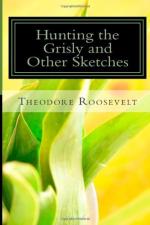Bears are hunted in many ways. Some are killed by poison; but this plan is only practised by the owners of cattle or sheep who have suffered from their ravages. Moreover, they are harder to poison than wolves. Most often they are killed in traps, which are sometimes dead-falls, on the principle of the little figure-4 trap familiar to every American country boy, sometimes log-pens in which the animal is taken alive, but generally huge steel gins. In some states there is a bounty for the destruction of grislies; and in many places their skins have a market price, although much less valuable than those of the black bear. The men who pursue them for the bounty, or for their fur, as well as the ranchmen who regard them as foes to stock, ordinarily use steel traps. The trap is very massive, needing no small strength to set, and it is usually chained to a bar or log of wood, which does not stop the bear’s progress outright, but hampers and interferes with it, continually catching in tree stumps and the like. The animal when trapped makes off at once, biting at the trap and the bar; but it leaves a broad wake and sooner or later is found tangled up by the chain and bar. A bear is by no means so difficult to trap as a wolf or fox although more so than a cougar or a lynx. In wild regions a skilful trapper can often catch a great many with comparative ease. A cunning old grisly however, soon learns the danger, and is then almost impossible to trap, as it either avoids the neighborhood altogether or finds out some way by which to get at the bait without springing the trap, or else deliberately springs it first. I have been told of bears which spring traps by rolling across them, the iron jaws slipping harmlessly off the big round body. An old horse is the most common bait.
It is, of course, all right to trap bears when they are followed merely as vermin or for the sake of the fur. Occasionally, however, hunters who are out merely for sport adopt this method; but this should never be done. To shoot a trapped bear for sport is a thoroughly unsportsmanlike proceeding. A funny plea sometimes advanced in its favor is that it is “dangerous.” No doubt in exceptional instances this is true; exactly as it is true that in exceptional instances it is “dangerous” for a butcher to knock over a steer in the slaughter-house. A bear caught only by the toes may wrench itself free as the hunter comes near, and attack him with pain-maddened fury; or if followed at once, and if the trap and bar are light, it may be found in some thicket, still free, and in a frenzy of rage. But even in such cases the beast has been crippled, and though crazy with pain and anger is easily dealt with by a good shot; while ordinarily the poor brute is found in the last stages of exhaustion, tied tight to a tree where the log or bar has caught, its teeth broken to splinted stumps by rabid snaps at the cruel trap and chain. Some trappers kill the trapped grislies with a revolver; so that it may easily be seen that the sport is not normally dangerous. Two of my own cowboys, Seawell and Dow, were originally from Maine, where they had trapped a number of black bears; and they always killed them either with a hatchet or a small 32-calibre revolver. One of them, Seawell, once came near being mauled by a trapped bear, seemingly at the last gasp which he approached incautiously with his hatchet.




